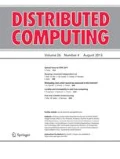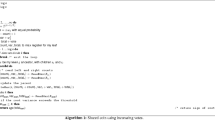Summary
We consider agreement and leader election on asynchronous complete networks when the processors are reliable, but some of the channels are subject to failure. Fischer, Lynch, and Paterson have already shown that no deterministic algorithm can solve the agreement problem on asynchronous networks if any processor fails during the execution of the algorithm. Therefore, we consider only channel failures. The type of channel failure we consider in this paper is Byzantine failure, that is, channels fail by altering messages, sending false information, forging messages, losing messages at will, and so on. There are no restrictions on the behavior of a faulty channel. Therefore, a faulty channel may act as an adversary who forges messages on purpose to prevent the successful completion of the algorithm. Because we assume an asynchronous network, the channel delays are arbitrary. Thus, the faulty channels may not be detectable unless, for example, the faulty channels cause garbage to be sent. We present the first known agreement and leader election algorithm for asynchronous complete networks in which the processors are reliable but some channels may be Byzantine faulty. The algorithm can tolerate up to
faulty channels, where n is the number of processors in the network. We show that the bound on the number of faulty channels is optimal. When the processors terminate their corresponding algorithms, all the processors in the network will have the same correct vector, where the vector contains the private values of all the processors.
Similar content being viewed by others
References
Abu-Amara HH: Fault-tolerant distributed algorithm for election in complete networks. IEEE Trans Comput 37(4): 449–453 (1988)
Abu-Amara HH, Lokre J: Election in asynchronous complete networks with intermittent link failures. IEEE Trans Comput 43(7): 778–788 (1994)
Afek Y, Gafni E: Time and message bounds for election in synchronous and asynchronous complete networks. SIAM J Comput 20: 376–394 (1991)
Alsberg PA, Day JD: A principle for resilient sharing of distributed resources. Proc 2nd International Conference on Software Engineering, San Francisco, CA, pp 562–570, October 1976
Bar-Yehuda R, Kutten S: Fault-tolerant distributed majority commitment. J Algorithms 9: 569–582 (1988)
Ben-Or M: Another advantage of free choice: completely asynchronous agreement protocols. Proc 2nd ACM Symposium on Principles of Distributed Computing, Montreal, Quebec, Canada, pp 27–30, August 1983
Cristian F, Aghili H, Strong R, Dolev D: Atomic broadcasts from simple message diffusion to Byzantine agreement. Proc 15th International Symposium on Fault-Tolerant Computing, Ann Arbor, Michigan, pp 200–206, June 1985. A revised version appears as IBM Tech Rep RJ5244
Cimet IA, Kumar PRS: A resilient distributed protocol for network synchronization. ACM SIGCOMM Symposium on Communications, Architecture, and Protocols, Stowe, VT, August 1986, pp 358–376
Coan BA, Welch JL: Modular construction of a Byzantine-agreement protocol with optimal message bit complexity. Inf Computation 97(1): 61–85 (1992)
Dolev D: The Byzantine generals strike again. J Algorithms 3(1): 14–30 (1982)
Dolev D, Dwork C, Stockmeyer L: On the minimal synchronism needed for distributed consensus. J Assoc Comput Machinery 34: 77–97 (1987)
Fischer MJ, Lynch NA, Merritt M: Easy impossibility proofs for distributed consensus problems. Distrib Comput 1: 26–39 (1986)
Fischer MJ, Lynch NA, Paterson MS: Impossibility of distributed consensus with one faulty process. J Assoc Comput Machinery 32: 374–382 (1985)
Frederickson GN, Lynch NA: Electing a leader in a synchronous ring. J Assoc Comput Machinery 34: 98–115 (1987)
Gafni E: Improvements in the complexity of two message-optimal election algorithms. Proc 4th ACM Symposium on Principles of Distributed Computing, Minacki, Ontario, Canada, August 1985, pp 175–185
Goldreich O, Shrira L: Electing a leader in a ring with link failures. Acta Inf 24: 79–91 (1987)
Korach E, Moran S, Zaks S: Tighter lower and upper bounds for some distributed algorithms for a complete networks of processors. Proc 3rd ACM Symposium on Principles of Distributed Computing, Vancouver, B.C., Canada, August 1984, pp 199–207
Lamport L, Shostak R, Pease M: The Byzantine generals problem. ACM Trans Program Lang Syst 4(3): 382–401 (1982)
Lynch N, Fischer M, Fowler R: A simple and efficient Byzantine Generals algorithm. Proc IEEE 2nd Symposium on Reliability in Distributed Software and Database Systems, Pittsburgh, PA, pp 46–52, July 1982
Masuzawa T, Nishikawa N, Hagihara K, Tokura N: Optimal fault-tolerant distributed algorithms for election in complete networks with a global sense of direction. Proc 3rd International Workshop on Distributed Algorithms, Nice, France, September 1989. Also in: Distributed algorithms Lect Notes Comput Sci, Vol 392, pp 171–182. Berlin Heidelberg New York: Springer, 1989
Mattern F: Message complexity of simple ring-based election algorithms—an empirical analysis (extended abstract). Proc IEEE 9th International Conference On Distributed Computing Systems, pp 94–100, 1989
Menasce DA, Popek GJ, Muntz RR: A locking protocol for resource coordination in distributed databases. ACM Trans Database Syst 5: 103–138 (1980)
Mohan C, Strong R, Finkelstein S: Method for distributed commit and recovery using Byzantine agreement within clusters of processors. Proc 2nd ACM Symposium on Principles of Distributed Computing, Montreal, Quebec, Canada, pp 89–103, August 1983
Pease M, Shostak R, Lamport L: Reaching agreement in the presence of faults. J Assoc Comput Machinery 27: 228–234 (1980)
Singh G: Efficient distributed algorithms for leader election in complete networks. Proc 11th IEEE International Conference on Distributed Computing Systems, pp 472–479, 1991
Author information
Authors and Affiliations
Corresponding author
Rights and permissions
About this article
Cite this article
Sayeed, H.M., Abu-Amara, M. & Abu-Amara, H. Optimal asynchronous agreement and leader election algorithm for complete networks with Byzantine faulty links. Distrib Comput 9, 147–156 (1995). https://doi.org/10.1007/s004460050016
Received:
Accepted:
Issue Date:
DOI: https://doi.org/10.1007/s004460050016




